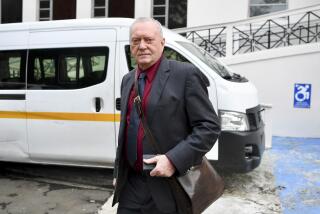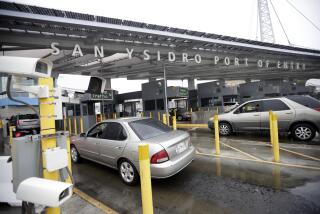Ex-CIA Official Is Convicted on Two Perjury Charges : Verdict: Federal jury acquits Clair E. George of five other counts in Iran-Contra case. He faces a maximum sentence of 10 years in prison.
- Share via
WASHINGTON — A federal court jury convicted Clair E. George, the highest-ranking former CIA official charged in the Iran-Contra scandal, on two perjury charges Wednesday.
After deliberating for nearly 11 days, the jurors acquitted George of five other charges in his monthlong retrial. A court clerk reading the verdicts aloud announced three consecutive “not guilty” findings before reaching the first “guilty” verdict.
George, 62, flinched at the word. The clerk quickly announced a second “guilty.” Both convictions were on charges that he lied in 1986 to congressional investigators trying to determine the extent of the government’s role in resupplying anti-government rebels in Nicaragua.
George, whose first trial ended in a hung jury last August, faces a maximum punishment of 10 years in prison and fines of $500,000 when he is sentenced Feb. 18 by U.S. District Judge Royce C. Lamberth.
He was acquitted of three charges that he lied to congressional committees, as well as two counts that he lied to a grand jury that questioned him in 1991.
Afterward, George said simply that he wanted to thank “my family and friends for supporting me over the last year and a half.”
So far only one defendant has gone to jail for offenses in the six-year-old scandal, which occurred during the Ronald Reagan Administration and involved secret sales of arms to Iran and use of the proceeds to fund Nicaragua’s Contras. The one jailed defendant was Thomas G. Clines, a former CIA operative who was convicted of tax-related charges.
Overall, George’s case is the 11th conviction obtained by the office of independent counsel Lawrence E. Walsh. But the two biggest convictions have been overturned on appeal--those of former White House aide Oliver L. North and former White House National Security Adviser John M. Poindexter. Seven others resulted from negotiated plea agreements.
Jurors arrived at their verdicts after “lots of careful thought and discussion,” according to juror Margarita Torres.
“None of the counts came easily,” she said in an interview. “We spent most of our time discussing the interpretation of words used in the charges, as well as questions put by congressmen.”
Craig Gillen, the chief prosecutor, said that he is “very pleased” by the verdict and conceded that it has furnished a much-needed boost to Walsh’s staff.
Noting that George directed all overseas spy operations before retiring in 1987, Gillen said that the jury’s verdict “marks the first time a senior CIA official was convicted of felony offenses for crimes committed while he was in his position at the CIA.”
The prosecutor added that, “on a broader basis, word has gone out to senior officials of the intelligence agencies that they cannot use the secrets of our nation to hide if they commit crimes, that the judicial process can and will continue.”
However, Gillen said he wanted to make clear that “this is a conviction of Clair George” and “not of every CIA employee . . . or individuals who have served their entire careers in the CIA, both in the United States and overseas.”
Richard A. Hibey, George’s attorney, told reporters that he expects to appeal the verdict “if resources are available,” noting that legal expenses already are running “in excess of $1 million.”
He called George “a great patriot who unfortunately got caught up in partisan disputes over the wisdom of a certain policy.”
He was referring to George’s appearance before Senate and House committees in late 1986, when congressional investigators were trying to determine whether the Reagan Administration was secretly aiding the Contras in violation of a law that prohibited such aid.
George, testifying on his behalf at both his trials, said that he was trying to protect the CIA because he knew the secret resupply mission was being run out of the White House by North. He said that he “made some honest mistakes” in his congressional testimony and suffered from memory lapses.
George was convicted of making a false statement to the House Intelligence Committee on Oct. 14, 1986, about his knowledge of Felix Rodriguez, a CIA operative in Latin America who assisted North in resupplying the Contras.
George also was convicted of perjury before the Senate Intelligence Committee on Dec. 3, 1986, when he denied knowing the role of former Air Force Maj. Gen. Richard V. Secord, North’s logistics assistant.
The prosecution submitted evidence that George had met with Secord and that he knew about the activities of Rodriguez, including his code name, Max Gomez.
More to Read
Sign up for Essential California
The most important California stories and recommendations in your inbox every morning.
You may occasionally receive promotional content from the Los Angeles Times.










